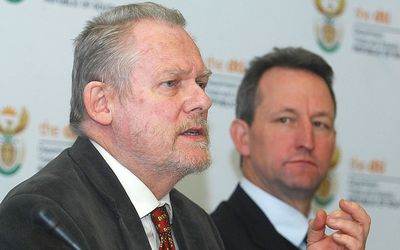THERE are no signs that the planned adoption of the Promotion of Investment Bill has frightened off foreign investors, Trade and Industry Minister Rob Davies said on Tuesday.
His remarks at a media briefing ahead of the National Assembly debate on the bill contrasted sharply with the views of Democratic Alliance (DA) spokesman on trade and industry Geordin Hill-Lewis, who said in his speech that the "bad" bill would discourage investment once it became law and that it sent a wrong message about SA’s openness to business.
The DA, Economic Freedom Fighters and Inkatha Freedom Party have all opposed the bill.
However, Mr Davies said the Department of Trade and Industry had a potential foreign investment pipeline of about R30bn, and this only included those investments brought to its attention.
Earlier this week, BMW announced plans to invest R6bn in its Rosslyn plant to produce its X3 series. Mr Davies said investors were interested in what was happening on the ground and were protected by the Constitution.
"Many investors have looked at the environment in SA and seen that they can find opportunities here," he said. "The level of formal investment protection has a very, very slight, if any, impact on actual investment decisions."
SA remained open to foreign investment and, given the low value of the rand, offered good investment opportunities, he said.
Mr Hill-Lewis said foreign investors insisted they would be less likely to invest in SA if the bill became law.
"It is a bad bill because it does not allay the concerns of investors; in fact, it adds to them. And it gives absolutely no protection to foreign investors beyond that which is already available under general South African law."
The bill is aimed at providing a harmonised legal framework for investment and replaces bilateral investment treaties the government terminated when they were due to expire. Key elements relative to provisions in the treaties are the removal of recourse by investors to international arbitration for the settlement of disputes and the introduction of "policy space" for the government to legislate in the national interest.
Mr Davies said it was in line with the trend to review and reform investment-protection regimes. The architecture of these regimes provided investors with iron-clad guarantees against expropriation and widely defined guarantees against indirect expropriation, as well as providing guarantees for fair and equitable treatment.
These provisions had created an "increasingly litigious" international system of arbitration in which investors took governments to arbitration intruding on their right to regulate.
The litigation by multinational tobacco companies against anti-smoking measures was an example of this, along with litigation against the renewable energy industry by the German government.
SA was an early mover in this trend because the bilateral investment treaties came up for renewal and the government had to decide whether to continue with them or move to a new legislative regime.

OPPORTUNITIES: Trade and Industry Minister Rob Davies is confindent about the planned Promotion of Investment Bill, despite criticism that it is not good for investment. Picture: PUXLEY MAKGATHO
THERE are no signs that the planned adoption of the Promotion of Investment Bill has frightened off foreign investors, Trade and Industry Minister Rob Davies said on Tuesday.
His remarks at a media briefing ahead of the National Assembly debate on the bill contrasted sharply with the views of Democratic Alliance (DA) spokesman on trade and industry Geordin Hill-Lewis, who said in his speech that the "bad" bill would discourage investment once it became law and that it sent a wrong message about SA’s openness to business.
The DA, Economic Freedom Fighters and Inkatha Freedom Party have all opposed the bill.
However, Mr Davies said the Department of Trade and Industry had a potential foreign investment pipeline of about R30bn, and this only included those investments brought to its attention.
Earlier this week, BMW announced plans to invest R6bn in its Rosslyn plant to produce its X3 series. Mr Davies said investors were interested in what was happening on the ground and were protected by the Constitution.
"Many investors have looked at the environment in SA and seen that they can find opportunities here," he said. "The level of formal investment protection has a very, very slight, if any, impact on actual investment decisions."
SA remained open to foreign investment and, given the low value of the rand, offered good investment opportunities, he said.
Mr Hill-Lewis said foreign investors insisted they would be less likely to invest in SA if the bill became law.
"It is a bad bill because it does not allay the concerns of investors; in fact, it adds to them. And it gives absolutely no protection to foreign investors beyond that which is already available under general South African law."
The bill is aimed at providing a harmonised legal framework for investment and replaces bilateral investment treaties the government terminated when they were due to expire. Key elements relative to provisions in the treaties are the removal of recourse by investors to international arbitration for the settlement of disputes and the introduction of "policy space" for the government to legislate in the national interest.
Mr Davies said it was in line with the trend to review and reform investment-protection regimes. The architecture of these regimes provided investors with iron-clad guarantees against expropriation and widely defined guarantees against indirect expropriation, as well as providing guarantees for fair and equitable treatment.
These provisions had created an "increasingly litigious" international system of arbitration in which investors took governments to arbitration intruding on their right to regulate.
The litigation by multinational tobacco companies against anti-smoking measures was an example of this, along with litigation against the renewable energy industry by the German government.
SA was an early mover in this trend because the bilateral investment treaties came up for renewal and the government had to decide whether to continue with them or move to a new legislative regime.























Change: -0.09%
Change: -0.09%
Change: -0.36%
Change: 0.49%
Change: -3.31%
Data supplied by Profile Data
Change: 0.00%
Change: 0.00%
Change: -0.09%
Change: 0.00%
Change: 0.00%
Data supplied by Profile Data
Change: -0.06%
Change: 0.01%
Change: 0.01%
Change: -0.09%
Change: 0.51%
Data supplied by Profile Data
Change: 0.00%
Change: 0.00%
Change: 0.00%
Change: 0.00%
Change: 0.00%
Data supplied by Profile Data